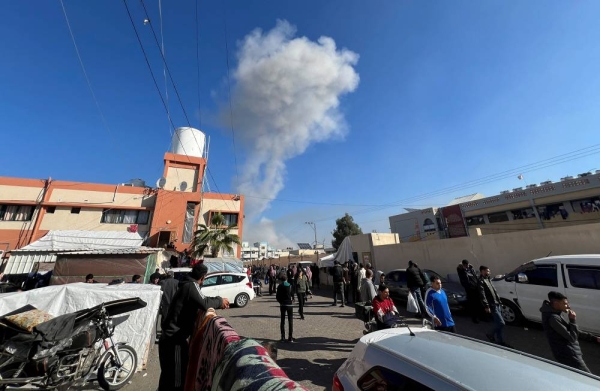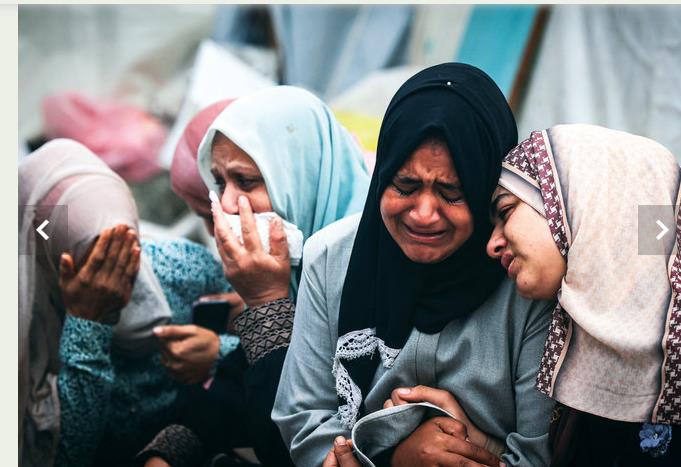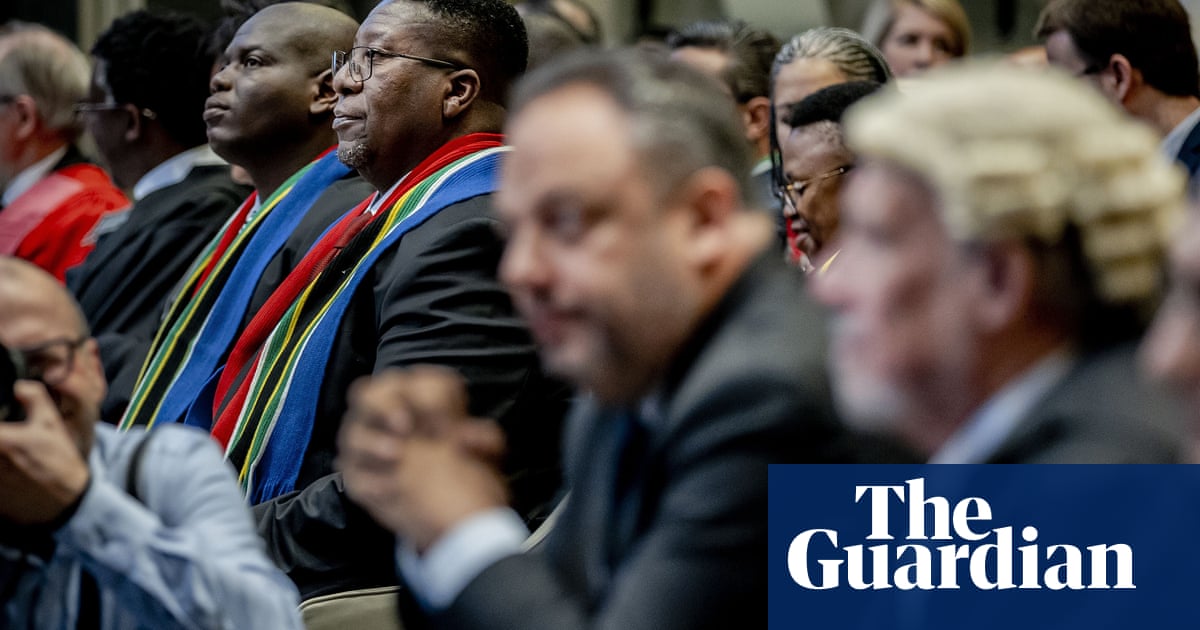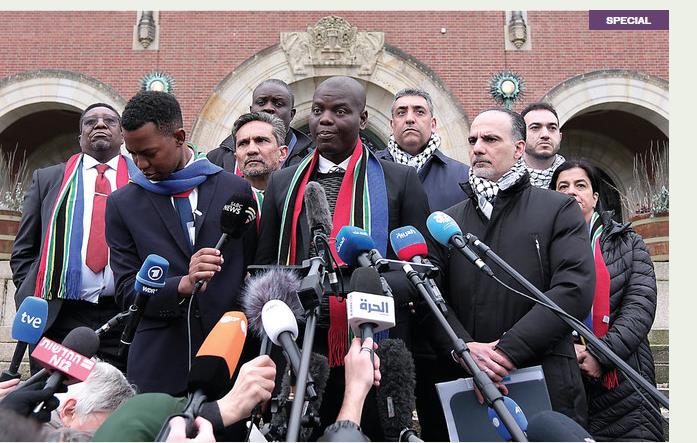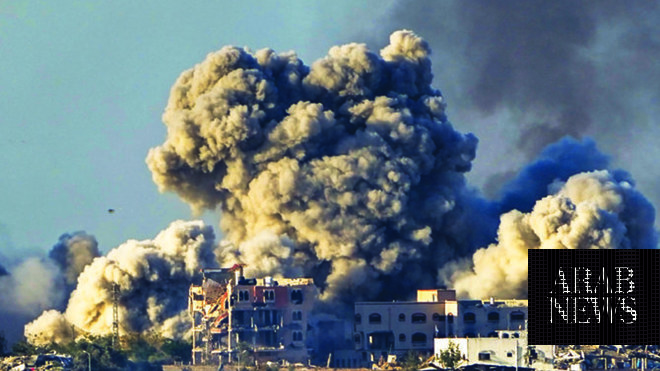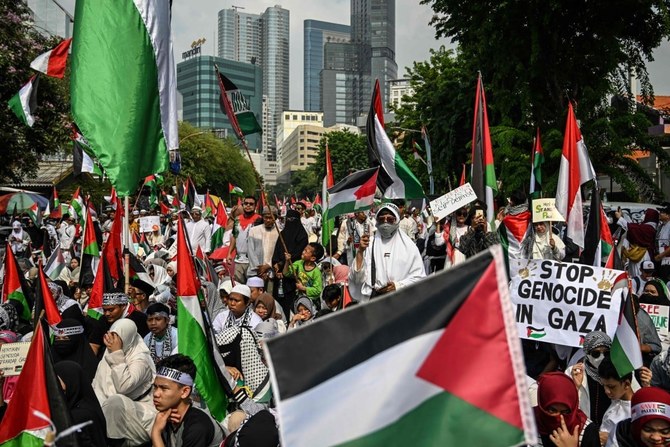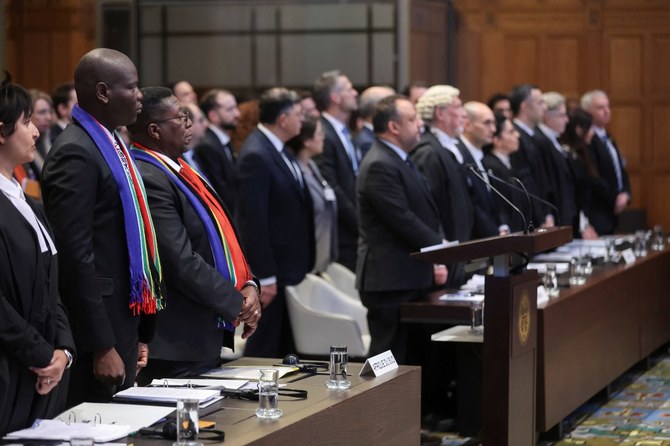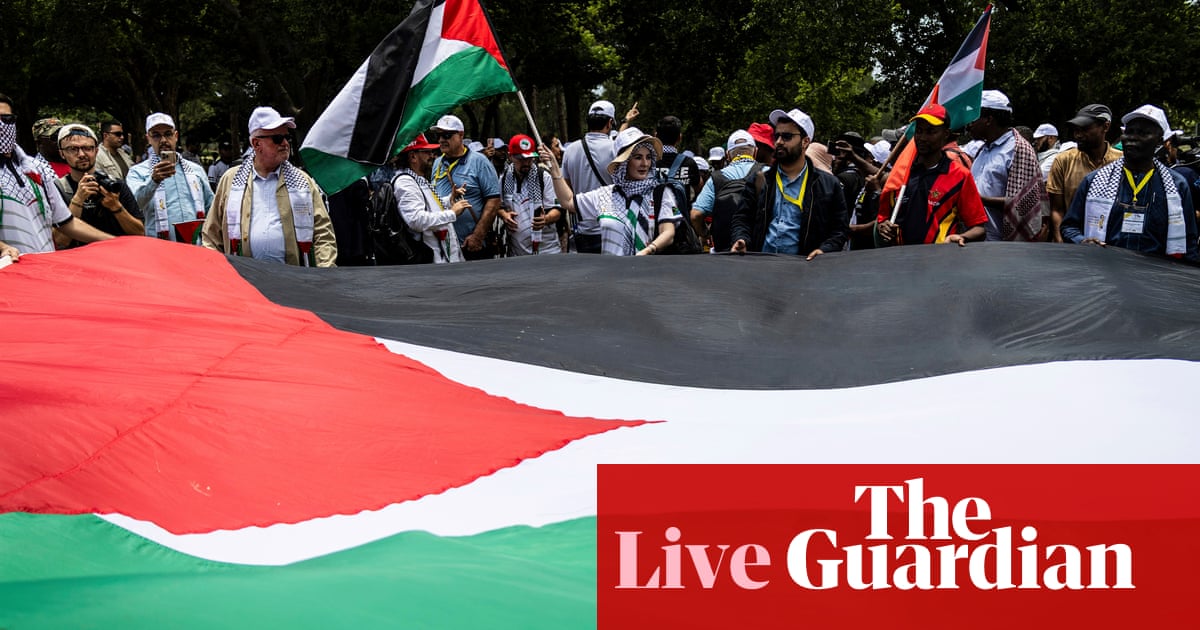
ICJ to hold public hearings on South Africa"s genocide case against Israel next week
The international court of justice will hold public hearings on the request for the indication of provisional measures submitted by South Africa in its case against Israel over “genocidal” acts in Gaza next week.
In a press release on Wednesday, the ICJ said that it will hold public hearings at the Peace Palace in The Hague next Thursday and Friday.
It added:
“The hearings will be devoted to the request for the indication for provisional measures contained in South Africa’s application.
In its request, South Africa asks the court to indicate provisional measures in order to ‘protect against further, severe, and irreparable harm to the rights of the Palestinian people under the Genocide Convention’ and ‘to ensure Israel’s compliance with its obligations under the Genocide Convention not to engage in genocide, and to prevent and punish genocide.’”
Israeli public figures have accused the country’s judiciary of ignoring incitement to genocide in Gaza where Israeli strikes have killed over 22,300 Palestinians since October 7.
The Guardian’s Emma Graham-Harrison and Quique Kierszenbaum reports:
A group of prominent Israelis has accused the country’s judicial authorities of ignoring “extensive and blatant” incitement to genocide and ethnic cleansing in Gaza by influential public figures.
In a letter to the attorney general and state prosecutors, they demand action to stop the normalisation of language that breaks both Israeli and international law.
“For the first time that we can remember, the explicit calls to commit atrocious crimes, as stated, against millions of civilians have turned into a legitimate and regular part of Israeli discourse,” they write. “Today, calls of these types are an everyday matter in Israel.”
Signatories include one of Israel’s top scientists, the Royal Society member Prof David Harel, alongside other academics, former diplomats, former members of the Knesset, journalists and activists.
Represented by the human rights lawyer Michael Sfard, their 11-page letter contains multiple examples of “the discourse of annihilation, expulsion and revenge”.
The list of elite Israelis who have incited war crimes includes cabinet ministers and Knesset members, former top military officials, academics, media figures, social media influencers and celebrities, the letter says.
A local Hezbollah official and two other members were killed on Wednesday in an Israeli strike on southern Lebanon, Reuters reports two security sources saying.
Wednesday’s strike bring the death toll in Israeli strikes in southern Lebanon to nine Hezbollah members since the Iran-backed group began exchanging fire with Israeli forces at the start of October.
On Tuesday, Hamas chief Saleh al-Arouri was killed in Dahiyeh, a Hezbollah stronghold in Beirut. Both Hezbollah and Hamas have blamed Israel, with Hezbollah chief Hassan Nasrallah calling the killing “flagrant Israeli aggression”.
UK foreign secretary David Cameron said that “more must be done to get humanitarian aid into Gaza” and that Israel “must allow significantly more supplies in to reduce the risk of hunger and disease”, Agence France-Presse reports.
“The UK also wants to see the immediate release of hostages and progress towards a sustainable ceasefire,” Cameron, who was previously the UK prime minister, said.
He added that he discussed the issue with Israel’s new foreign minister Israel Katz.
The first UK maritime shipment of aid to Gaza arrived in Egypt this week, Agence France-Presse reports. According to the British government, the shipment carried nearly 90 tons of thermal blankets, shelter packs and other medical supplies.
The shipment is set to be transferred to the Rafah crossing by the Egyptian Red Crescent and will be distributed by UNRWA, the UN agency for Palestinian refugees, across Gaza.
The US said that it is “not seeing any acts that constitute genocide” in Gaza, referring to South Africa’s case against Israel in the international court of justice in which it accused Israel of “genocidal” acts across Gaza.
In a news briefing on Wednesday, US state department spokesperson Matthew Miller responded to a question about South Africa’s request to the ICJ to issue an urgent order declaring that Israel was violating the Genocide Convention by saying:
“Those are allegations that should not be made lightly ... we are not seeing any acts that constitute genocide… That is a determination by the state department.”
Miller’s comments come as Israeli strikes have killed over 22,300 Palestinians across the Gaza – which human rights organizations have described as an “open air prison” - since 7 October. Meanwhile, Israeli strikes have forcibly displaced 1.9 million Palestinian survivors from their homes, leaving them grappling with severe shortages in basic necessities including food, water, fuel and medical supplies.
In November, a group of UN human rights experts warned that “grave violations committed by Israel against Palestinians in the aftermath of 7 October, particularly in Gaza, point to a genocide in the making”.
The ICJ has scheduled public hearings for next Thursday and Friday to hear oral arguments from South Africa and Israel surrounding South Africa’s case.
ICJ to hold public hearings on South Africa"s genocide case against Israel next week
The international court of justice will hold public hearings on the request for the indication of provisional measures submitted by South Africa in its case against Israel over “genocidal” acts in Gaza next week.
In a press release on Wednesday, the ICJ said that it will hold public hearings at the Peace Palace in The Hague next Thursday and Friday.
It added:
“The hearings will be devoted to the request for the indication for provisional measures contained in South Africa’s application.
In its request, South Africa asks the court to indicate provisional measures in order to ‘protect against further, severe, and irreparable harm to the rights of the Palestinian people under the Genocide Convention’ and ‘to ensure Israel’s compliance with its obligations under the Genocide Convention not to engage in genocide, and to prevent and punish genocide.’”
EU foreign policy chief condemns Israeli ministers" calls for Palestinian emigration from Gaza
Josep Borrell, the European Union’s foreign policy chief, has condemned what he called “inflammatory” comments made by two Israeli ministers who said Palestinians should emigrate from Gaza.
In a tweet on Wednesday, Borell wrote:
“I strongly condemn the inflammatory & irresponsible statements by Israeli ministers Ben Gvir & Smotrich slandering the Palestinian population of Gaza & calling for a plan for their emigration.
Forced displacements are strictly prohibited as a grave violation of IHL [international humanitarian law] & words matter.”
On Monday, Israel’s national security minister Itamar Ben-Gvir called for promoting a “solution to encourage the emigration of Gaza’s residents” and re-establishment of Israeli settlements across Gaza.
Meanwhile, Israel’s finance minister Bezalel Smotrich called for the return of Israeli settlers to Gaza, adding that Israel should “encourage” Gaza’s 2.4 million Palestinian population to leave their land.
Here are some images coming through the newswires from Gaza where Israeli strikes have killed more than 22,300 Palestinians since 7 October while survivors grapple with severe shortages in food, water, fuel and medical supplies:
The US will continue to maintain a significant military presence in the Middle East, White House national security spokesperson John Kirby said on Wednesday, Reuters reports.
Kirby’s comments come amid fierce fighting between Israel and Hamas in Gaza, as well as the killing of senior Hamas figure Saleh al-Arouri who was killed in a drone strike in Lebanon on Tuesday. Both Hezbollah and Hamas have blamed Israel, with Hezbollah head Hassan Nasrallah calling the killing “flagrant Israeli aggression”.
A Qatari aircraft carrying 37 tons of aid for Palestinians in Gaza arrived in El Arish, Egypt, on Wednesday.
The aid includes shelter kits and food items that will be further transferred to Gaza, the Qatari foreign ministry said in an announcement.
Wednesday’s aircraft delivery brings the total amount of aid planes sent from Qatar to Gaza to 58, with a total of 1,814 tons of aid.
Summary
It’s 9pm in Gaza City and Tel Aviv. Here are the latest headlines …
The United States remains “incredibly concerned” about the risk of the Israel-Gaza war spreading to other fronts, according to the US state department. The state department also said the US was not involved and had no reason to believe that Israel was involved in the explosions in central Iran earlier on Wednesday, nor was the US government was not given any advance notice about the strike in Beirut on Tuesday that killed a senior Hamas leader.
Hezbollah head Hassan Nasrallah, in a long speech in Beirut on Wednesday, asserted that the attacks on southern Israel by Hamas on 7 October, with militants bursting out of Gaza, has damaged Israel and the effects were not yet done. “What has happened since 7 October and what will happen in the future has weakened Israel,” he said.
In Nasrallah’s speech he extended condolences to the family of the senior Hamas figure Saleh al-Arouri who was killed in a drone strike in Lebanon on Tuesday. Hezbollah and Hamas have blamed Israel. He called the killing of Arouri “flagrant Israeli aggression on Beirut’s Dahiyeh” suburb.
EU foreign policy chief warned that the ‘Middle East might end up in flames’ if the current conflict escalates. Josep Borrell said at an event in the Portuguese capital Lisbon on Wednesday that the international community must impose a solution to the Israel-Gaza conflict as the warring sides are unable to come to terms.
Two explosions have killed at least 73 people [note: since updated to 103] and injured scores more at a memorial ceremony in Iran marking the fourth anniversary of the US killing of Qassem Suleimani, the military commander of Iran’s al-Quds force. A senior official called the blasts a “terroristic” attack, without elaborating on who could be behind them.
The Israeli army has said it is “prepared for any scenario” in the aftermath of a strike in Beirut that killed Hamas’s deputy chief. The assassination has stoked fears the war in the Gaza could boil over into a wider regional conflict. Iran has described the Israeli drone strike that killed the senior Hamas official Saleh al-Arouri late on Tuesday afternoon in Beirut as a “cowardly terrorist operation”. Israel has not formally said it carried out the attack.
Six people were killed in the explosion, reports say, including Arouri and two leaders of Hamas’s al-Qassam Brigades. Lebanon’s caretaker prime minister, Najib Mikati, condemned a “new Israeli crime” and said the country was filing a complaint to the UN security council.
Hezbollah said its finger “is on the trigger” as it promised vengeance for Arouri’s death. The group said the attack in Beirut was “a serious assault on Lebanon … that will not go without a response or punishment” in a statement posted to Telegram.
A spokesperson for UN peacekeeping force Unifil inside Lebanon has said the organisation is “deeply concerned” about possible escalation in the region. A statement said “We are deeply concerned at any potential for escalation that could have devastating consequences for people on both sides of the blue line. We continue to implore all parties cease their fire, and any interlocutors with influence to urge restraint.”
Israel’s military has said that “intensive battles” continue in Khan Younis in the south of the Gaza Strip. It says that an IDF fighter jet struck an Islamic Jihad weapons production complex in the city, and that “during searches in a school, the troops located a tunnel shaft and photos of weapons”. The death of a soldier announced overnight by the IDF has brought the total number of losses for the Israeli army to 509 since 7 October. The claims have not been independently verified.
Israel’s national security minister, Itamar Ben-Gvir, has been critical of US opposition to his previously stated push for the transfer of Palestinians out of Gaza. In a social media message posted overnight, Ben-Gvir said “The US is our best friend, but first of all we will do what is best for the state of Israel”. The US state department has pushed back against suggestions from some Israeli ministers that Israel could expel Palestinians from Gaza as part of a “day after” scenario for the war, saying “Gaza is Palestinian land and will remain Palestinian land.”
A total of 22,313 Palestinians have been killed and 57,296 have been injured in Israeli strikes on Gaza since 7 October, the Gaza health ministry said in a statement. 128 Palestinians were killed and 261 injured in the past 24 hours, the ministry, which is run by Hamas, added. At least 85% of the population of the Gaza Strip has already been displaced from their homes by Israel’s military actions. It has not been possible for journalists to independently verify the casualty figures being issued during the conflict.
Israeli government spokesperson Eylon Levy has accused the World Health Organization of having “blood on its hands”, saying its silence about allegations of hospitals being used by Hamas “tells terrorists: keep going”. The comments came after US media reports claimed US intelligence believed Hamas had been active in the al-Shifa hospital complex, using it as a command and control centre, and holding “at least a few hostages” there.
My colleague Maya Yang is taking over the blog now for the next few hours. Stick with us as we bring you the developments as they happen.
Hezbollah chief Hassan Nasrallah did not signal an immediate ramping up of the Lebanese militant and political group’s conflict with Israel, during a speech in Beirut earlier.
Here are some other takes on the speech from a BBC and a Reuters journalist via X-Twitter.
US still "concerned" about Gaza conflict spreading
The United States remains “incredibly concerned” about the risk of the Israel-Gaza war spreading to other fronts, according to the US state department.
Meanwhile, the state department in a briefing said that the US was not involved in any way and had no reason to believe that Israel was involved in the explosions in central Iran earlier on Wednesday, Reuters reports.
Two explosions killed at least 103 people and injured scores more at a memorial ceremony in Iran marking the fourth anniversary of the US killing of Qassem Suleimani, the head of Iran’s Quds Force and one of the most powerful men in the Middle East, the Guardian has reported.
A senior Iranian official called the blasts a terrorist attack, without elaborating on who could be behind them. No one has immediately claimed responsibility for what appeared to be the deadliest attack to target Iran since its 1979 Islamic Revolution.
The US state department also said that the US government was not given any advance notice about the strike in Beirut on Tuesday that killed a senior Hamas leader, which has been attributed by the US, Hamas, Hezbollah and others to Israel, although Israel has not officially taken responsibility. Hamas and Hezbollah are allies against Israel in what they term the Axis of Resistance, with Iran and others.
Even as Hezbollah head Hassan Nasrallah was getting ready to say in a speech in Beirut that Israel’s “real objective” in Gaza was to rid the territory of Palestinians, the United Nations office for the coordination of humanitarian affairs posted that “nearly 85% of people in Gaza have begun 2024 in a state of displacement”.
The UN office, with bases in New York and Geneva, has lamented the mass displacement and conditions for those of the 2.3 million Palestinians in Gaza who have been forced from their homes.
In a post on X-Twitter it said that as most of those displaced were “squeezed into extremely overcrowded spaces, the spread of diseases has intensified, putting a strain on an already overwhelmed health system that is struggling to meet immense needs”.
Actually the UN agency for Palestine refugees, UNRWA, estimates that 90% of the Gaza population has been displaced.
Hezbollah head Hassan Nasrallah finished his speech in Beirut moments ago by saying “we do not fear war” with Israel.
He said that the killing of a senior Hamas figure, Saleh al-Arouri, in Lebanon yesterday at the Beirut offices of Hamas, for which Hamas and its ally, Iran-backed Hezbollah, blame Israel “will not go unanswered or unpunished.”
Nasrallah pledged that the killing of Arouri on Lebanese soil represented “a major, dangerous crime about which we cannot be silent.”
He warned that if Israel chose war with Hezbollah “it will be very costly.”
He said that support for Palestinian resistance was growing across Lebanon.
The speech lasted for approximately an hour and 20 minutes.
Hezbollah leader pledges a "weakened Israel"
Hezbollah head Hassan Nasrallah is close to wrapping up a long speech in Beirut that was scheduled before the senior Hamas figure Saleh al-Arouri was killed in a drone strike when he was at the Hamas offices in Beirut on Tuesday.
But he asserted that the attacks on southern Israel by Hamas on 7 October, with militants bursting out of Gaza, has damaged Israel and the effects were not yet done.
“What has happened since 7 October and what will happen in the future has weakened Israel,” he said.
He is now warning that if Israel [further] attacks Lebanon the resistance from Hezbollah, the anti-Israeli militant group and political force based in Lebanon will know no limits.
Hezbollah and Hamas blame Israel for the killing of Arouri on Tuesday, while Israel has not formally declared responsibility.
Nasrallah accuses US of "preventing the end of the war in Gaza"
Hezbollah head Hassan Nasrallah has addressed his remarks in an ongoing speech towards the Israeli military, declaring “God willing, you will not be able to achieve the goals of your war” against Hamas in Gaza and Hamas leaders more widely.
He also said “it is the Americans who are preventing the end of the war in Gaza” in its full-throated governmental support for Israel in its retaliation prompted by the Hamas attacks on southern Israel on 7 October, including the snatching of hostages, many of whom are still being held in Gaza.
Israel has killed more than 22,000 people in Gaza, mostly Palestinian civilians, and wounded more than 60,000, according to the Hamas leaders who govern the besieged Gaza Strip.
Earlier Nasrallah called out passionately: “From the river to the sea the land of Palestine is for the Palestinians and the Palestinian people only.”
The phrase “from the river to the sea” is interpreted by many as an antisemitic and anti-Zionist calling for the destruction of the state of Israel, but by others as a simple plea for the liberation of the Palestinian people and the establishment of a universally recognised state of Palestine.
Hezbollah leader Hassan Nasrallah said that the attacks on southern Israel by Hamas fighters on 7 October “dealt a severe blow to normalisation efforts” that had been taking place between various Arab governments and Israel in recent years.
The latest country that had been moving closer to normalising relations with Israel prior to the Hamas attacks was a giant traditional enemy of the Jewish state, Saudi Arabia, under the auspices of the United States, now led by Joe Biden in a Democratic administration but accelerated by his Republican predecessor (and rival for the presidency again in 2024, Donald Trump).
Since 2020, in agreements brokered by Trump’s administration, the UAE, Bahrain, Morocco and Sudan have agreed to normalise relations despite the ongoing occupation of the Palestinian territories.
In his speech that is still ongoing in Beirut, Nasrallah said that the Hamas attacks, which he referred to by the Islamist militant forces’ favoured name of Operation al-Aqsa Flood, was not just a strike against such normalisation but also had caused Israel’s deterrence capability to collapse.
The Hezbollah leader, Hassan Nasrallah, is accusing Israel of holding “the real objective” in its attacks on Gaza of driving all the Palestinians out of the territory.
“The objective is quite clear,” the leader said in his speech being delivered in Beirut, according to the English interpreter of his speech.
Nasrallah pointed to the “people forced to leave their homes in Gaza and the West Bank, to some extent, and southern Lebanon”.
“We have seen the great dangers … but at the same time we have seen the resistance and the defiance … the refusal to surrender of Gaza,” he said.
Nasrallah accused Israel of “starving people and inflicting the largest war of genocide during this century” against the Palestinians in Gaza.
Hezbollah leader Hassan Nasrallah’s speech in Beirut is on a lengthy passage focusing further on the late Iranian commander Qassem Suleimani, the fourth anniversary of whose assassination by US forces was marked by fatal explosions at a memorial event in central Iran earlier on Wednesday.
Nasrallah said Suleimani was a driving force in uniting various forces against Israel and western support for Israel in Lebanon, Palestine, Syria, Iraq, Yemen “and other countries”.
He said Suleimani led coordination and collaboration between elements of what Hezbollah and other anti-Israeli figures call the ”axis of resistance”.
Hezbollah blames ‘flagrant Israeli aggression’ for death of Hamas figure in Lebanon
Hezbollah leader Hassan Nasrallah’s speech in Beirut is under way and he has extended condolences to the family of the senior Hamas figure Saleh al-Arouri who was killed in a drone strike in Lebanon on Tuesday.
Nasrallah said he would come back to the topic of the assassination later in his speech.
Hezbollah and Hamas have blamed Israel for the killing of Arouri although the government of Benjamin Netanyahu has not officially declared responsibility for the strike on Arouri in Beirut or the explosions in Iran earlier on Wednesday.
He called the killing of Arouri “flagrant Israeli aggression on Beirut’s Dahiyeh”.
Dahiyeh is a predominantly Shia Muslim suburb to the south of central Beirut, where Hamas had an office.
Hezbollah supports Hamas and is backed by Iran in its aggressive existential opposition to Israel.
This blog is quoting Nasrallah in English as provided by an interpreter giving a live voiceover on Al Jazeera TV as the Hezbollah leader delivers his speech.
The leader of Hezbollah, Hassan Nasrallah, has begun a speech in Beirut. He has flagged that he will talk about the explosions in Iran earlier on Wednesday, the Israeli battle being waged in Gaza and Tuesday’s killing of a senior Hamas leader, who was in Beirut when he was hit with a drone strike.
First Nasrallah extended “our congratulations and condolences” for the “martyrdom” of Qassem Suleimani, the head of Iran’s al-Quds force, who was killed four years ago. At a memorial event for that death earlier today, more than 100 people were killed in two explosions.
Hezbollah blamed Israel for the explosions in Iran and for the killing on Tuesday of Saleh al-Arouri, a senior Hamas leader, in Lebanon at the Hamas office in Beirut. Israel has not been confirmed as the perpetrator of either event.
Suleimani was killed in Baghdad by US forces in 2020. Hezbollah supports Hamas and is backed by Iran.
There are big demonstrations going on in Ramallah in the Israeli-occupied West Bank to protest the assassination of a senior Hamas leader, Saleh al-Arouri, on Tuesday.
Arouri was killed in Beirut by a drone strike widely attributed to Israel.
The event threatens a significant and dangerous escalation of Israel’s war against Hamas and its related conflict with the Lebanese militant group Hezbollah.
The Hezbollah leader Hassan Nasrallah is due to give a speech in Beirut right now, in which he is expected to address the fact that the strike occurred inside Lebanon.
Here are some images from Ramallah.
Vladimir Putin, the president of Russia, has said more about the attacks in central Iran earlier on Wednesday at the memorial event for the US killing of Qassem Suleimani, the head of Iran’s al-Quds force, four years ago.
After condemning “terrorism in all its forms” and sending condolences to Iran, Putin also said the attack, which has killed many members of the general public attending the event, was “shocking in its cruelty and cynicism”, Reuters reports.
No entity has yet declared responsibility for the explosions at the event. Russia and Iran are strategic allies.
The explosions occurred close to the tomb where Suleimani is buried, in the central Iranian city of Kerman.
Russia’s president, Vladimir Putin, has just condemned “terrorism in all its forms” and sent condolences to its ally Iran after the violent events there today.
Two explosions killed at least 103 people and injured scores more at a memorial ceremony in Iran marking the fourth anniversary of the US killing of Qassem Suleimani, the head of Iran’s al-Quds force and one of the most powerful men in the Middle East.
Putin is speaking out after the attack that took place at the cemetery in the central Iranian city of Kerman, Reuters is reporting, citing the Russian domestic news agency RIA.
A senior official there has called the blasts a “terroristic” attack, without elaborating on who could be behind them. No one has immediately claimed responsibility for what appeared to be the deadliest attack to target Iran since its 1979 Islamic Revolution.
We’ll bring you more of Putin’s statement shortly.




